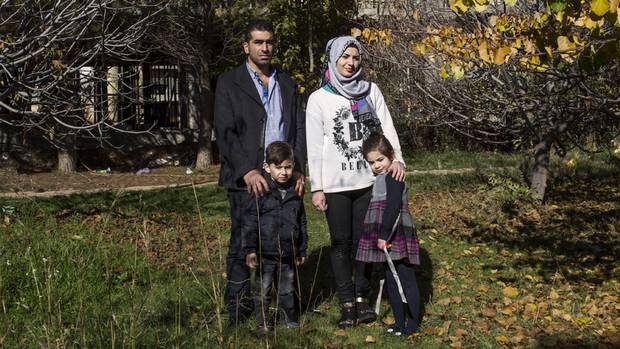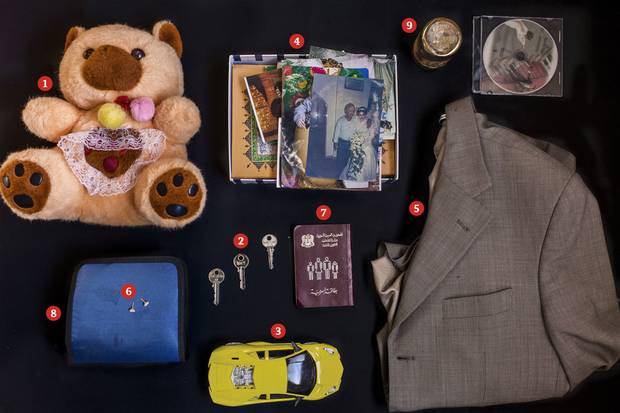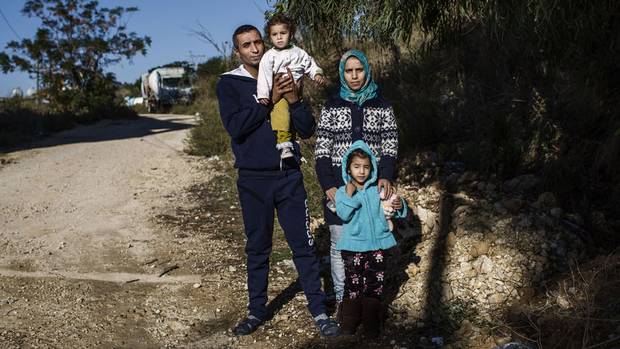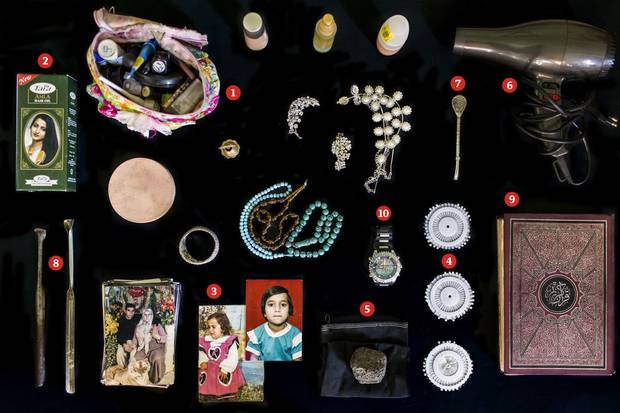The Habash and Dalaa families are among thousands who are coming to Canada as newly resettled Syrian refugees. The Syria they left is no longer recognizable as the home they loved and their future in a foreign country they know little about still feels uncertain.
In conversations a few days before their departure, the families knew they were leaving Wednesday – on commercial flights to Toronto, according to the UN refugee agency here – but little else was definite. (They were in the resettlement pipeline to Canada before the Trudeau government announced a special program to bring in 25,000 Syrian refugees over the next months.)
They focused on what to carry and resolved to keep packing: jars of cured eggplants, photographs, an old watch, a hairdryer, a teddy bear. Each item a piece of a person who once had to decide between life and death. They pack not knowing the baggage weight allowance, but both families figure it will be more than enough; they left their homes in Syria with only what they could carry in a matter of minutes.

Mohamed and Almasa Habash, with 5-year-old Nada and Thaem, 4, fled Zabadani, Syria, three years ago and will be on a plane this week bound for Canada.
Diego Ibarra Sánchez / MeMo/for The Globe and Mail
THE HABASH FAMILY In the children's bedroom are piles of suitcases bursting with clothes. Shoes, sweaters and blankets are scattered on the floor. Nada, 5, sits by the window, haloed in sunlight, practising French words from a schoolbook. The snow-capped summit of Mount Hermon is just about visible from their humble Zahle home, in Lebanon's Bekaa Valley.
Nada's mother, Almasa, sets aside two large jars. In one she pours kishk, a powdery white substance made of drained yogurt used in Levantine cuisine. In another she puts makdous or oil-cured eggplants, a Syrian specialty that can be preserved for months.
"I don't think they're going to let you take that," interjects Mohamed, her husband.
Theirs was a middle-class family in Zabadani, a town near the Lebanon-Syria border. Mohamed had studied law and opened up a retail business requiring frequent trips to China; his wife was pursuing a degree in civil engineering.
Today, as Mohamed packs, his neighbourhood of Madaya is under a rebel-held siege and the fate of his 70-year-old father is unknown. A friend recently told them their former neighbour Moussa Alwan died of starvation.

Diego Ibarra Sánchez/The Globe and Mail
1) Dana, the teddy bear Nada's only request is that they bring the teddy bear her aunt gave her as a gift when she was just two years old. She named it Dana, for her cousin left behind. The little girl caresses Dana's plush exterior; it is evident she takes great care of her favourite toy which still looks brand new.
2) Keys to the house Almasa unzips a pouch and holds up a set of gleaming keys.
"You're taking the keys to our house in Syria with you?" Mohamed asks. "Yes," his wife responds diffidently, "You never know. We might use them again."
They made the difficult decision to leave when armed men began roaming their streets. Syria's troubles would pass in a few months, Mohamed rationalized back then. They locked their house before they left, thinking they would return in at most three months.
3) The yellow car The couple's four-year-old son, Thaem, is less sentimental about the whole packing affair.
"What do you want to bring with you to Canada?" asks Almasa. The boy smiles mischievously. "Toys," he says, pausing here to think. "And potato chips."
"What about your bicycle?" his mother suggests, teasing. She knows they have no room for it.
"Yes, that too."
"But how are you going to ride it in the snow?"
He settles for the yellow toy car given to them as a gift by a Lebanese neighbour from Taalabaya, a nearby town where they first settled before moving to Zahle. "To remind Thaem of their kindness," his mother says.
4) Photographs Almasa leafs through the photo album her mother came all the way from Rif Damascus, an area in the war-torn country still considered relatively safe, to bring. She holds up a portrait from 2008, her eyes kohl-rimmed and hair combed in dramatic upsweep. "Our engagement party," she smiles.
She wonders which to take and which to leave behind. "These are our memories from Syria," she says. "So many to choose, but we can't take them all."
Mohamed looks over her shoulder and picks one up of newborn Nada. "We had such great plans about how we wanted to raise our children," he says.
5) Grey jacket Mohamed brings out the dashing grey suit he wore on his wedding day and folds it neatly. The wedding was one of the happiest days of his life.
Almasa and Mohamed met in Zabadani's bustling souk in 2008 when she happened on his shop to take a look. She had come by chance from Rif Damascus to visit a cousin. "I told her, 'You're beautiful,'" he recalls. Soon they were married, had children and hoped of moving to the city; he imagined himself wearing the jacket in their new dynamic life in teeming Damascus.
"This is coming," he says, now very much in the uncertain present. "Along with those two," he adds, pointing at the kids.
6) Mother's earrings The two diamond studs still sparkle in Almasa's hands: a gift from her mother on her wedding day. The family had sold most of her jewellery once Mohamed's savings dried up after a protracted stay in Lebanon, where he struggled to find work. But she could not bring herself to sell the two studs. They were purchased from a jeweller in Aleppo in the 1920s and have been in the family ever since. "I want to give them to Nada someday," says Almasa.
7) Family booklet Suddenly Almasa jumps up, runs to their bedroom and brings out the family booklet, a passport-size document indispensable for registering marriages and enrolling children in school in Syria. In it are the recorded dates of Nada's and Thaem's birth, old photographs and records.
But, in Canada it will have no value, Mohamed argues.
"So what?" Almasa says. "It has our memories."
8) Arabic films "To be honest, I don't really like Arabic films that much, but I don't think we can find them in Canada," says Almasa.
9) Incense Whenever a guest would come to visit their Zabadani house, Almasa would perfume the house by burning bukhoor, the Arabic name for scented wood chips. As a child, Almasa knew when she detected the sweet fragrance permeate through their house that a special guest – and likely presents – would be arriving. "I think they said smell brings back strong memories. Even now, the smell of bukhoor reminds of better times in Syria," she says.

Iwan and Zamzam Dalaa pose with daughters Karima, 5, and Ayat, 1. The family fled their hometown of Sekeen in Idlib four and a half years ago.
Diego Ibarra Sánchez / MeMo/for The Globe and Mail
THE DALAA FAMILY From the balcony of their makeshift home in an unfinished building in Dbayeh, a commercial area just outside Beirut, Zamzam Dalaa can see the azure waters of the Mediterranean. She comes here to find solace from the anxiety of packing and the myriad questions playing out frantically in her mind.
"Can we bring baby's milk?" she asks her husband, Iwan. "I think yes, if it's dry," he responds. "What about medicine for the baby?" she wonders aloud.
Maybe put that in the checked luggage, he suggests.
Iwan is anxious too, but for different reasons. He feels their departure is a dream from which he will soon awake. "I'm afraid that if I get the flu, they'll cancel our flight," he says.
Then there are the rumours he's heard about life in the West for refugees. "Is it true they are going to put us in one big prison?" he asks.
Their five-year-old daughter, Karima, squeals with delight as Zamzam opens the old suitcase and pulls the items she deems essential for travel from the drawers.
A cold gust of wind gives Ayat, Karima's year-old sister, a shiver. Zamzam holds her close and looks down at the objects on the floor, a frown etched on her forehead.

Diego Ibarra Sánchez/The Globe and Mail
1) Makeup "I am not leaving the country without this," she says, holding up her bag. She takes out the essentials: liquid foundation, lipstick, eye kohl "from the souks of Damascus," sponge, blush and an astonishing array of nail polish. In the Syrian city of Salqin, in Idlib province, Zamzam was a woman known to take great care of her looks. Even in Lebanon, she has found frugal ways to maintain her appearance even when facing dire financial straits.
2) Hair oil "I had a friend bring this for me from Syria last year, and I've been rationing it ever since," explains Zamzam. "I can't find it anywhere and I am sure I won't be able to find it in Canada."
3) Childhood photographs "Look at us!" cries Zamzam poring through the photos of her and Iwan from when they were young. She wants to bring them so Karima and Ayat can see what a happy childhood their parents had in Idlib, Zamzam explains. "When they grow up they will be curious," she says.
4) Pins to fashion the hijab "I am sure I won't find these in Canada," Zamzam says.
5) Exfoliant Loofah, a spongy hand-held body scrubber, is popular in the Levant, but in Syria, Zamzam used a local product made from a rock. "It's like loofah, but it's better," she says.
6) Hairdryer "This is the best hairdryer in the world – from Syria," she says. Zamzam purchased it years ago in a souk in Salqin when she moved from her father's house to make a home with Iwan. The groom is usually responsible for furnishing a home for the bride. It is a 220-volt appliance, which won't work in Canada. "I was thinking about the details," she explains, as she packs it. "I was thinking I'll need a hairdryer."
7) Mate straw Iwan's drink of choice is the traditional mate, made of steeped dried herbs served in a calabash gourd. In the Levant, it is consumed with a metal straw that Iwan is convinced they will not find in Canada. "Make sure you bring the straw," he tells Zamzam. Knowing him too well, she has already placed it among the items to be packed.
8) Mankara One of Zamzam's favourite foods is kousa or stuffed zucchini. To make the dish, a good mankara, a tool resembling a long apple corer, is critical. She likes the metal ones she purchased in Syria when she married Iwan. In Lebanon, they use wooden ones, she says with a roll of her eyes.
9) Koran "What about the Koran? Am I allowed to take the Koran?" Zamzam asks Iwan. Her husband shrugs. "I've just heard it might not be allowed in Canada."
Every night Zamzam reads her children a few passages from the Muslim holy book. "It calms me," she says.
10) Watch A year before Iwan left Salqin, his brother bought him a watch as an Eid present. "He told me he was proud of me," he recalls. At the time he had been working as a furniture upholsterer for 16 years and was making enough money to support his mother and sisters.
When Iwan decided it was imperative to leave because of the outbreak of war, his brother stayed behind in Salqin, unwilling to leave their home. He is still there, under threat from air strikes and sniper fire, still intent on protecting the family home.
"I love him a lot," Iwan says.
Two families of Syrian refugees arrive in Toronto, thank Canada
1:25